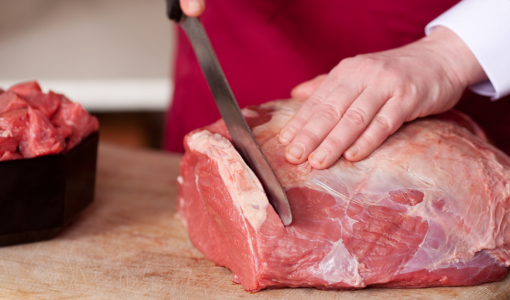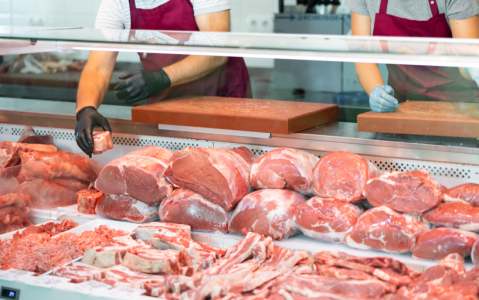Experts reveal best and worst supermarket meat cuts—essential insights
By
- Replies 19
Navigating the aisles of your local ALDI, Coles, or Woolworths can be daunting, especially when selecting the best cuts of meat for your hard-earned dollar.
With the rising cost of living, making informed choices at the supermarket is more critical than ever for the savvy shopper.
When it comes to meat, the question often arises: should you stick to the convenience of the supermarket or venture to the local butcher for your carnivorous needs?
While there's a certain charm to the personalised service and potential quality found at a butcher's shop, supermarkets have stepped up, offering a range of meats that satisfy your palate and your wallet.
Chef Amber Merlo, a culinary expert and former contestant on the New Zealand cooking show Cooks On Fire, has shared her insights on the best quality meats to pick up from these supermarkets.
‘They’re usually priced well and of a decent quality,’ she said.
‘These cuts are also super versatile, and the supermarkets always have great stock levels.’
‘You’ll often find that similar quality cuts will be much more expensive at the butcher.’
While supermarket meats may not always rival the offerings of specialty butchers, they generally meet everyday cooking expectations.
The cuts are often uniform in size and conveniently portioned, making meal prep a breeze.
Merlo recommended the supermarket's mince or ground beef products for their affordability and satisfactory quality.
Pre-marinated meats are another excellent supermarket choice. They promise good quality at a reasonable price point, saving you time and effort in the kitchen.
In a recent social media video, gut health coach Charley O’Halloran praised the quality of specific cuts available at Coles.
He highlighted Cleavers' organic and grass-fed beef mince, sausages, and other mince-based products as top picks.
‘They’ve also got venison and kangaroo, both of these are wild meats, so they’re going to be fed a wild diet, (meaning) they will be really good quality,’ he said.
O’Halloran also suggested trying Coles lamb's fry, a mix of liver, kidney, and hearts. While not grass-fed or organic, these cuts offer an affordable alternative to the pricier butcher options.
Food scientist Vincent Candrawinata advised shoppers to look for meats that are fresh and bright in colour, indicators of good quality.
He also stressed the importance of checking expiry dates and the cleanliness of the store to avoid the risk of contamination.
On the other hand, certain meats that experts suggested that you might want to skip at the supermarket are better sourced from a butcher.
According to Merlo, premium cuts of red meat, such as sirloin, T-bone, eye fillet, and tomahawk steak, are better sourced from a butcher.
‘Steaks in the supermarket are cut very thin, which makes them easy to overcook,’ Merlo noted.
‘They can be lacking in flavour and often be a little fatty.’
Despite Merlo's endorsement of supermarket chicken and pork, O’Halloran avoids these meats from Coles, citing quality concerns.
He prefers organic, free-range chicken, which most supermarkets may not readily offer.
‘I do think quality matters with these,’ he said.
‘Even the free-range chickens will have been fed a poor diet.’
‘When it comes to chicken, I want it to be that organic, free-range (quality) which you can’t get at most Coles.’
Choosing where to buy your meat may come down to convenience and cost.
But armed with this expert advice, you can make informed decisions that balance quality with budget-friendly options.
‘If the store appears unclean or unsanitary, it’s best to avoid purchasing meat from there as it may increase the risk of contamination,’ he continued.
‘Trust your instinct.’
In related news, Aussie farmers are advocating for a new labelling system for red meat products that would provide detailed information on animal-raising methods, similar to egg labelling.
Proposed labels would specify if the meat is from grass-fed, grain-fed, organic, or hormone-free animals, empowering consumers to make informed choices. Learn more about this initiative here.
 What have your experiences been with purchasing meat from ALDI, Coles, and Woolies? Do you have any tips or favourite cuts to share? Feel free to share them in the comments below.
What have your experiences been with purchasing meat from ALDI, Coles, and Woolies? Do you have any tips or favourite cuts to share? Feel free to share them in the comments below.
With the rising cost of living, making informed choices at the supermarket is more critical than ever for the savvy shopper.
When it comes to meat, the question often arises: should you stick to the convenience of the supermarket or venture to the local butcher for your carnivorous needs?
While there's a certain charm to the personalised service and potential quality found at a butcher's shop, supermarkets have stepped up, offering a range of meats that satisfy your palate and your wallet.
Chef Amber Merlo, a culinary expert and former contestant on the New Zealand cooking show Cooks On Fire, has shared her insights on the best quality meats to pick up from these supermarkets.
‘They’re usually priced well and of a decent quality,’ she said.
‘These cuts are also super versatile, and the supermarkets always have great stock levels.’
‘You’ll often find that similar quality cuts will be much more expensive at the butcher.’
While supermarket meats may not always rival the offerings of specialty butchers, they generally meet everyday cooking expectations.
The cuts are often uniform in size and conveniently portioned, making meal prep a breeze.
Merlo recommended the supermarket's mince or ground beef products for their affordability and satisfactory quality.
Pre-marinated meats are another excellent supermarket choice. They promise good quality at a reasonable price point, saving you time and effort in the kitchen.
In a recent social media video, gut health coach Charley O’Halloran praised the quality of specific cuts available at Coles.
He highlighted Cleavers' organic and grass-fed beef mince, sausages, and other mince-based products as top picks.
‘They’ve also got venison and kangaroo, both of these are wild meats, so they’re going to be fed a wild diet, (meaning) they will be really good quality,’ he said.
O’Halloran also suggested trying Coles lamb's fry, a mix of liver, kidney, and hearts. While not grass-fed or organic, these cuts offer an affordable alternative to the pricier butcher options.
Food scientist Vincent Candrawinata advised shoppers to look for meats that are fresh and bright in colour, indicators of good quality.
He also stressed the importance of checking expiry dates and the cleanliness of the store to avoid the risk of contamination.
On the other hand, certain meats that experts suggested that you might want to skip at the supermarket are better sourced from a butcher.
According to Merlo, premium cuts of red meat, such as sirloin, T-bone, eye fillet, and tomahawk steak, are better sourced from a butcher.
‘Steaks in the supermarket are cut very thin, which makes them easy to overcook,’ Merlo noted.
‘They can be lacking in flavour and often be a little fatty.’
Despite Merlo's endorsement of supermarket chicken and pork, O’Halloran avoids these meats from Coles, citing quality concerns.
He prefers organic, free-range chicken, which most supermarkets may not readily offer.
‘I do think quality matters with these,’ he said.
‘Even the free-range chickens will have been fed a poor diet.’
‘When it comes to chicken, I want it to be that organic, free-range (quality) which you can’t get at most Coles.’
Choosing where to buy your meat may come down to convenience and cost.
But armed with this expert advice, you can make informed decisions that balance quality with budget-friendly options.
‘If the store appears unclean or unsanitary, it’s best to avoid purchasing meat from there as it may increase the risk of contamination,’ he continued.
‘Trust your instinct.’
In related news, Aussie farmers are advocating for a new labelling system for red meat products that would provide detailed information on animal-raising methods, similar to egg labelling.
Proposed labels would specify if the meat is from grass-fed, grain-fed, organic, or hormone-free animals, empowering consumers to make informed choices. Learn more about this initiative here.
Key Takeaways
- Expert recommendations suggested that certain types of meat, like chicken, pork, and mince, offer good value and are generally of decent quality at supermarkets.
- Premium cuts of red meat like sirloin and T-bone steaks should be avoided at supermarkets, as they may be thinner and lack the superior quality found at butcher shops.
- Organic and grass-fed options were highlighted as good quality meat choices available at supermarkets.
- Shoppers are advised to be cautious of the ingredients in supermarket sausages and to seek organic, free-range chicken.









